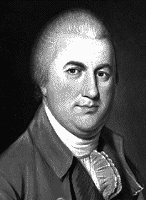As mentioned before, moderate nationalists were mostly from the three large states. Massachusetts did not have anyone quite as eminent as Virginia and Pennsylvania, but it did have two significant moderate nationalists.
Nathaniel Gorham. Nathaniel Gorham's most remarkable display of nationalism was his disregard for existing state lines. Like Madison, he pointed out that if the union broke up and state became independent countries, the small states would be at the mercy of the larger ones. Delaware would be at the mercy of Pennsylvania and really would be better off being annexed. New Jersey would be divided between Pennsylvania and New York; really it was in New Jersey's interest to cease to exist altogether. He did not see how the small states would be harmed by being annexed to their larger neighbors. Many colonies were created by the consolidation of smaller colonies. They, too, dreaded consolidation, but were not harmed by it. As for the large states, he believed they would be divided, not so much to keep them from threatening the small states as to keep them from encroaching on the central government. Like Madison, he believed that the stronger the central government, the more willingly states would give up territory.
On the other hand, he was not rigid on the subject of making representation proportional to population and agreed that representatives of large states might combine and have undue influence. He proposed system like Massachusetts had, with representation on a sliding scale of population, but fully proportional. He favored giving Congress the power to establish federal courts and regulate federal elections, and believed that it should meet every year to check the executive. He also favored allowing federal intervention in case of a rebellion in a state. Despite his nationalism, Gorham was pessimistic about the country's long-term prospects. He did not see the need for truly long-term planning because he did not believe the whole country would be a single nation in 150 years.
Rufus King. Rufus King was a delegate from Massachusetts with strong ties to New York. (He later moved to New York). Like other moderate nationalists, King believed that the new government should operate on individuals, not on states. He therefore saw no need for representation by states. He also believed that the role of the upper house was not to represent states, but to check the first branch and give it more stability and wisdom. If the states wanted to be represented, they would require a third house. This led King to initially oppose election of the Senate by state legislatures. Election by state legislatures would require each state to have at least one Senator, and would make the Senate too large if it were proportional. As an alternative protection for the smaller states, he proposed sort of bill of rights for states, guaranteeing them certain protections.
Ultimately, King agreed to the Great Comproimse and joined Morris in make the final proposal.
King favored giving Congress the power to form federal courts, regulate elections to Congress, purchase forts with the consent of the states, but not to charter corporations, which could lead to monopolies. He served on the committee that proposed to give Congress the power to organize, arm, and discipline the militia. He favored requiring the consent of the states for Congress to purchase forts on their territory. Like Morris, he questioned whether Congress would have to meet every year, since it would have fewer objects of legislation than the states. (And, like Morris, his concern may not have been so much states' rights as increasing the power of the executive). King's most significant difference with other moderate nationalists was that he believed the state legislatures were competent to ratify the Constitution, although he preferred special conventions to remove all doubt about its legitimacy. The distinction my seem unimportant today, but it was considered critically important at the time. If the Constitution were ratified by state legislatures, people might claim that the federal government was a creature of the states. Ratification by special conventions was meant to establish it as a government of the people.

